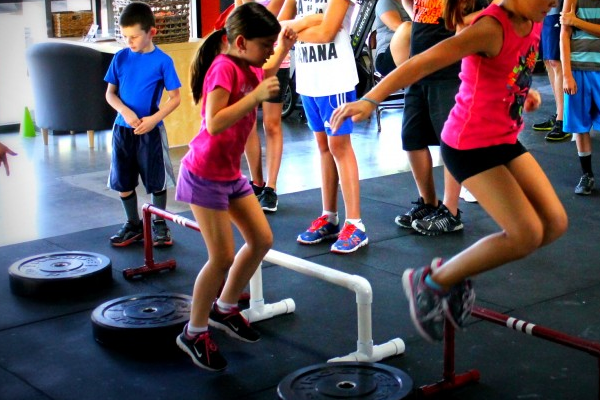
Strength Training for Kids
Many parents and physical education teachers have traditionally shied away from strength training with their children or students. However, there is sufficient research to suggest that strength training is a suitable and safe option for most youth.
Correcting the Misconceptions
There are a number of common myths about youth strength training that continue to cause concern among parents and educators. Two of the most common misconceptions are that strength training may stunt the growth of children and that children should not lift weights until they are 12 years old. There is simply no evidence to support either of these statements. In fact, all of the major fitness and medical organizations in the U.S. recommend strength training for youth, assuming that basic guidelines are adhered to and that appropriate leadership is present. And about the question of age, children can begin to train with weights as soon as they are able to accept and follow directions, usually around the age of seven or eight.
The Benefits
The benefits of youth strength training are similar to those for adults, though the importance of getting an early start cannot be overemphasized—the most important benefit of any youth fitness program is an improved attitude about lifelong activity. Improvements in muscular fitness, bone mineral density, body composition, motor fitness performance and injury resistance should be compelling evidence for all parents, though children will likely focus on things like enhanced sports performance and the social aspects of exercise. In fact, children don’t usually have the ability to comprehend long-term concepts until the ages of 11 to 14, so abstract ideas like healthy bones and disease prevention will do little to motivate them, and may in fact de-motivate some children. Stick with ideas like self-improvement and individual success, and always make sure everyone is having fun. Fun is the number one motivator in almost every aspect of a child’s life. Another compelling argument for youth strength-training programs is that significant improvements have been seen in the self-esteem, mental discipline and socialization of children who participate. Think back to your days in P.E. What games did you play? What types of physical attributes and skills were most often rewarded with success? Most likely, you are thinking of team games that featured speed, agility, jumping ability and overall athleticism. And those things should be rewarded! But a glaring omission in that list is muscular strength, and it is often overweight and obese children who will excel in that area. Weight training provides an opportunity to let children who typically struggle with group activities stand out from their classmates and perform well on an individual basis. What a tremendous way to boost self-esteem in the children who need it most.
How to Get Your Kids Started
It is important that parents and teachers do not impose training techniques and philosophies on children just because they may have worked for their own routines. Listen very closely to kids’ concerns and address them with care. Instructor attitude is of the utmost importance when working with kids. Start slowly and lean toward underestimating rather than overestimating the strength of young exercisers. Not only is it safer to do so, but it also leaves plenty of room for progress—and tangible progress is essential in the early stages of a youth strength-training program. The initial focus should be on developing good form and learning the basics of strength training.
Boost Kids' Self-Esteem
Introduce children to a variety of exercises and types of resistance. Most kids love to learn new things, so working with medicine balls and resistance tubing in addition to the more traditional free weights and machines is a great idea—and a much more affordable one. Just be sure that all the major muscle groups are addressed in a balanced, full-body workout. Finally, remember that your goals when exercising with children are simple: Be safe, have fun and help kids learn to love physical activity.
All these small victories add up to big fitness
Call Steve, In-Training Sports | 561-281-8330
In Training Sports
www.intrainingsports.com
3131 Village Blvd, #305
West Palm Beach, FL 33409